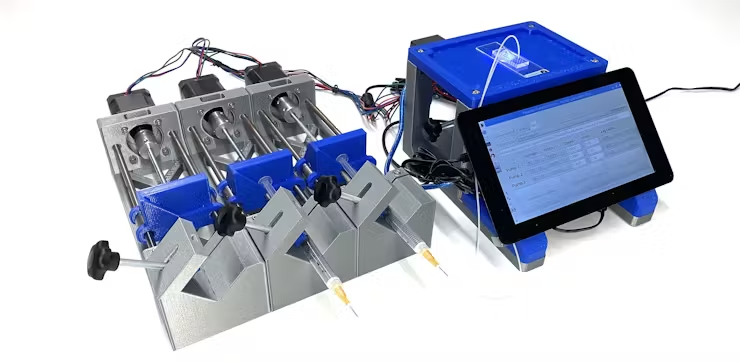|
APPLICATION Open Source Malaria is a collaborative project focused on discovering new, affordable treatments for malaria using open science principles. All research is publicly accessible, allowing global participation in finding a cure. |
CONTRIBUTORS Multiple global contributors including scientists, students, and citizen scientists. Key figures: Mat Todd, various research groups, and the general public. |
CONTACT opensourcemalaria@gmail.com |
|
FREE Free and open access to all research data and findings. |
PROGRESS Ongoing research and multiple potential drug candidates identified. Continuous development and open for contributions. |
RESOURCES https://opensourcemalaria.github.io/NewSite/ |
The Poseidon Project offers an open-source syringe pump and microscope system as an affordable alternative to commercial bioinstrumentation. Developed by the Pachter Lab at Caltech, Poseidon aims to provide accessible and customizable tools for bio-experiments, all for under $400. With 3D-printed parts and commonly available components, the system can be assembled in about an hour and is compatible with Windows, Mac, Linux, and Raspberry Pi, offering a user-friendly graphical interface for control.
Key Components of the Poseidon System
The Poseidon Project includes:
- Computer-Aided Design (CAD) files for 3D-printed parts.
- Controller software written in Python, along with a GUI to control the pumps.
- Arduino firmware to manage the motors.
- Bill of Materials for sourcing parts.
- Assembly instructions for easy setup.
- Executable files for major operating systems, including Mac, Windows, Linux, and Raspberry Pi.
These resources are openly available on the Poseidon GitHub repository, allowing users to download, modify, and build the system.
Customizable and Accessible Design
The Poseidon system is highly customizable, using Raspberry Pi and Arduino electronics, which have strong open-source hardware and software support. This modular design encourages users to add new features or modify existing components. The system can be used for microfluidics experiments and other lab applications, providing flexibility in bioengineering workflows.
The syringe pumps, designed using an Arduino with a CNC shield, allow for precise control over liquid intake and dispensation. The microscope, controlled via USB with a touchscreen, can connect to a Raspberry Pi or any compatible computer, enabling versatile setup options.
Community and Collaborations
The Poseidon Project builds upon prior work in open-source bioinstrumentation, including designs from the Pearce Research Group and the Satija Lab. By leveraging existing knowledge, Poseidon creates a bridge for researchers to access high-quality, low-cost tools for biological research and experimentation.
For more information and to access all necessary files, visit the Poseidon GitHub repository.

